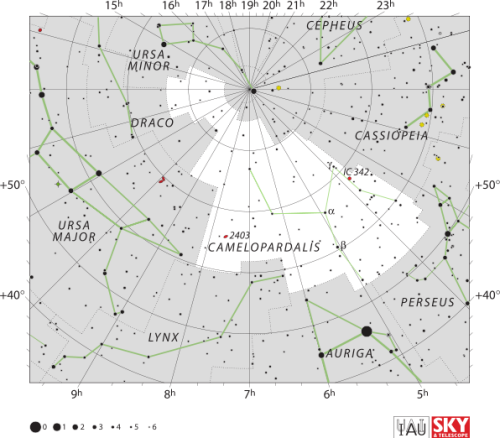Science
Related: About this forumA new major meteor shower in late May 2014? (earthsky.org)
By Deborah Byrd in
Blogs | Human World | Space on May 07, 2014
The Eta Aquarid meteor shower in early May has passed, and, by all reports, it was a slow year for these meteors. But don’t worry. In 2014, an exciting new meteor shower – the May Camelopardalids – might come on the scene. And it’s coming up soon! It’s predicted for the night of May 23-24. This possible shower stems from Comet 209P/LINEAR, discovered in 2004. If the predictions hold true, Earth might be sandblasted with debris from this comet, resulting in a fine display of meteors, or shooting stars on the evening of May 23, and the morning of May 24. Mid-northern North American latitudes are favored. Follow the links below to learn more about the possible 2014 meteor shower of Comet 209P/LINEAR.

***
lots more: http://earthsky.org/space/comet-209p-linear-meteor-shower-storm-may-2014
New England and eastern Canada should have a good view.
NRaleighLiberal
(60,015 posts)bananas
(27,509 posts)Seti has an information page, including a Fluxtimator updated for the comet: http://meteor.seti.org/
The Slooh observatory will be streaming a live view of the sky: http://events.slooh.com/stadium/comet-209plinear-meteor-shower-arizona-may-23-2014
theHandpuppet
(19,964 posts)... where it simply stated the shower could be viewed in southern Canada and the "continental US". Anyone have a map of just where in the "continental U.S." we can look for this event?
eppur_se_muova
(36,266 posts)So it's not like meteors are only going to come down in one area. It's basically a question of whether that particular spot in the sky will be above the horizon from your location at the time the debris cloud comes through. In some locations, the radiant may be above the horizon only during daylight hours; in others, it will be rising or setting at about the time the shower peaks. It's not an on/off situation -- the closer you are to being directly underneath Camelopardalis at that hour, the better, but being off by a few hours doesn't mean you won't see a good show. You're just less likely to catch the best part of the show.
Because of the time predicted for the meteor display, observers in southern Canada and the continental U.S. are especially well positioned to see the meteors in the early morning hours of May 24 (or late at night on May 23).
Observers on the opposite side of the Earth will be in daylight at that peak hour, with the radiant blocked from view by the ground under their feet, so no big show for them. 12 hrs later, they'll have a clear view, but the cloud will have mostly passed (at least that's the tentative prediction).
theHandpuppet
(19,964 posts)With my luck, though, the sky will probably be overcast. Happens every time.